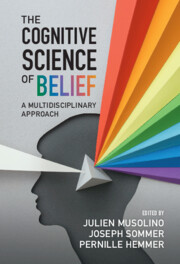Book contents
- The Cognitive Science of Belief
- The Cognitive Science of Belief
- Copyright page
- Contents
- Figures and Tables
- Contributors
- Chapter 1 Introduction
- Part I Understanding Belief
- Part II Domains of Beliefs
- Part III Variation in Beliefs
- Pathological Beliefs
- Individual Differences in Beliefs
- Environmental Effects on Beliefs
- Toward Better Beliefs
- Chapter 25 Training Can Improve Decision Making
- Chapter 26 Building Better Beliefs through Actively Open-Minded Thinking
- Index
- References
Chapter 26 - Building Better Beliefs through Actively Open-Minded Thinking
from Toward Better Beliefs
Published online by Cambridge University Press: 03 November 2022
- The Cognitive Science of Belief
- The Cognitive Science of Belief
- Copyright page
- Contents
- Figures and Tables
- Contributors
- Chapter 1 Introduction
- Part I Understanding Belief
- Part II Domains of Beliefs
- Part III Variation in Beliefs
- Pathological Beliefs
- Individual Differences in Beliefs
- Environmental Effects on Beliefs
- Toward Better Beliefs
- Chapter 25 Training Can Improve Decision Making
- Chapter 26 Building Better Beliefs through Actively Open-Minded Thinking
- Index
- References
Summary
The accelerating development of technological power over ourselves and our environment raises the stakes of getting our beliefs right. I suggest that we can significantly improve our processes of belief formation by increasing actively open-minded thinking (AOT). Actively open-minded thinking helps us form more accurate and well-rounded beliefs by increasing the depth and – more importantly – the breadth of information search and inference. Because individuals do not always have time for adequate investigation, AOT is also a valuable indicator of which epistemic authorities are most likely to have reached accurate conclusions via effective methods. It is associated with better reasoning across a wide variety of contexts, leading to beliefs that are more accurate, more complete, and less biased. Yet it is not regularly taught in schools, nor is it a feature of typical public discourse. I suggest several strategies for increasing this cognitive habit in school and society.
Keywords
- Type
- Chapter
- Information
- The Cognitive Science of BeliefA Multidisciplinary Approach, pp. 574 - 591Publisher: Cambridge University PressPrint publication year: 2022



